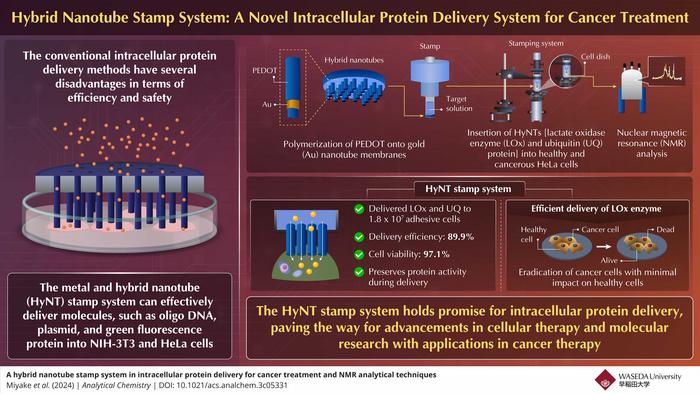In today’s medical landscape, precision medicine and targeted therapies are gaining traction for their ability to tailor treatments to individual patients while minimizing adverse effects. Conventional methods, such as gene transfer techniques, show promise in delivering therapeutic genes directly to cells to address various diseases. However, these methods face significant drawbacks, hindering their efficacy and safety.

Credit: Takeo Miyake from Waseda University
In today’s medical landscape, precision medicine and targeted therapies are gaining traction for their ability to tailor treatments to individual patients while minimizing adverse effects. Conventional methods, such as gene transfer techniques, show promise in delivering therapeutic genes directly to cells to address various diseases. However, these methods face significant drawbacks, hindering their efficacy and safety.
Intracellular protein delivery offers a promising approach for developing safer, more targeted, and effective therapies. By directly transferring proteins into target cells, this method circumvents issues such as silencing during transcription and translation and the risk of undesirable mutations from DNA insertion. Additionally, intracellular protein delivery allows for precise distribution of therapeutic proteins within target cells without causing toxicity.
A group of researchers led by Professor Takeo Miyake at Waseda University, Japan in collaboration with the Mikawa Group at the RIKEN Institute have now developed a hybrid nanotube stamp system for intracellular delivery of proteins. This innovative technique enables the simultaneous delivery of diverse cargoes, including calcein dye, lactate oxidase (LOx) enzyme, and ubiquitin (UQ) protein, directly into adhesive cells for cancer treatment. An article describing their research was published in Analytical Chemistry on May 14, 2024. This article has been co-authored by Dr. Tsutomu Mikawa, Dr. Masaomi Ikari, Dr. Hiromasa Yagi, Dr. Naoya Tochio, and Dr. Takanori Kigawa from RIKEN Center for Biosystems Dynamics Research, Japan and Mr. Bowen Zhang, Mr. Bingfu Liu, Mr. Zhouji Wu, and Mr. Kazuhiro Oyama from Waseda University, Japan.
Miyake briefly explains the stamp system assembly. “The HyNTs were synthesized through PEDOT polymerization onto Au nanotube membranes, and then assembled with a glass tube to create a stamp capable of physically inserting HyNTs into cells.”
The researchers explored the therapeutic potential of delivering LOx enzyme for cancer treatment. “Through our innovative stamp system, we successfully delivered LOx into both healthy mesenchymal stem cells (MSC) and cancerous HeLa cells. While MSC cells remained unaffected, we observed significant cell death in HeLa cancer cells following LOx treatment with viabilities decreasing over time. Our findings highlight the promising efficacy of intracellularly delivered LOx in selectively targeting and killing cancer cells, while sparing healthy cells, offering a targeted therapeutic strategy for cancer treatment,” explains Miyake.
Finally, the team successfully delivered 15N isotope-labeled UQ proteins into HeLa cells using the HyNT stamp system. This delivery allowed for the analysis of complex protein structures and interactions within the cells. In addition, optical and fluorescence imaging confirmed the presence of delivered UQ in HeLa cells, and nuclear magnetic resonance spectroscopy matched the intracellular UQ protein concentration with that of a solution containing 15N-labeled UQ. These results demonstrate the effectiveness of the stamp system in delivering target proteins for subsequent analysis.
The results demonstrate the remarkable capability of the HyNT stamp system in delivering LOx and UQ into a substantial number of adhesive cells, as required for regenerative medicine applications. The system achieved a notably high delivery efficiency of 89.9%, indicating its effectiveness in transporting therapeutic proteins into the target cells with precision. Moreover, the cell viability rate of 97.1% highlights the system’s ability to maintain the health and integrity of the treated cells throughout the delivery process.
The HyNT stamp system offers transformative potential in intracellular protein delivery, with applications spanning from cancer treatment to molecular analysis. Beyond medicine, its versatility extends to agriculture and food industries, promising advancements in crop production and food product development. With precise cell manipulation and efficient delivery, the HyNT stamp system is poised to revolutionize biomedical research, clinical practice, and diverse industries, paving the way for personalized interventions and shaping the future of modern medicine.
***
Reference
Authors: Bowen Zhang1,2, Bingfu Liu1, Zhouji Wu1, Kazuhiro Oyama1,2, Masaomi Ikari2, Hiromasa Yagi2, Naoya Tochio2, Takanori Kigawa2, Tsutomu Mikawa2, and Takeo Miyake1
Affiliations:
1Graduate School of Information, Production and Systems, Waseda University, Japan
2RIKEN Center for Biosystems Dynamics Research, Japan
About Waseda University
Located in the heart of Tokyo, Waseda University is a leading private research university that has long been dedicated to academic excellence, innovative research, and civic engagement at both the local and global levels since 1882. The University has produced many changemakers in its history, including nine prime ministers and many leaders in business, science and technology, literature, sports, and film. Waseda has strong collaborations with overseas research institutions and is committed to advancing cutting-edge research and developing leaders who can contribute to the resolution of complex, global social issues. The University has set a target of achieving a zero-carbon campus by 2032, in line with the Sustainable Development Goals (SDGs) adopted by the United Nations in 2015.
To learn more about Waseda University, visit
About Professor Takeo Miyake
Takeo Miyake is a Professor at the Faculty of Science and Engineering at Waseda University. He received his Ph.D. degree in Nanoscience & Nanoengineering from Waseda University. He is a member of the Materials Research Society, Surface Science Society of Japan, and Japan Society of Applied Physics. He received the Minister of Education, Culture, Sports, Science, and Technology Commendation Young Scientist Award in 2020. His research interests include bioiontronics, biofuel battery, bioprotonics, and bioelectronics. With over 2,763 citations, his notable achievements include pioneering work in enzymatic biofuel cells and interface science.
Journal
Analytical Chemistry
Method of Research
Experimental study
Subject of Research
Cells
Article Title
A Hybrid Nanotube Stamp System in Intracellular Protein Delivery for Cancer Treatment and NMR Analytical Techniques
Article Publication Date
14-May-2024
COI Statement
The authors declare no conflict of interest.



